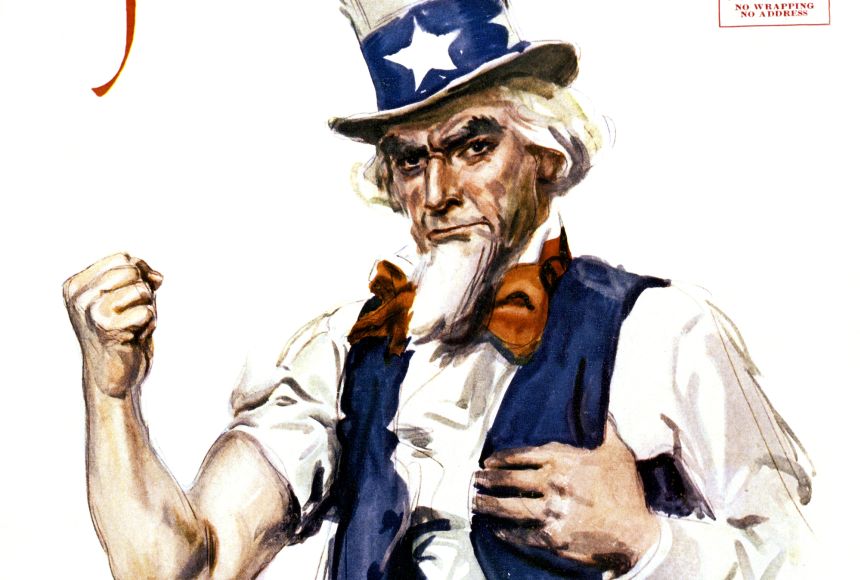
Andover – The summer of 2024 has been one of increased uncertainty and escalating inflammatory partisan speech. As one who was a high school football coach for many years, I’m reminded of countless pep rallies, in which the screaming, the cheering, the pulsing music and something akin to tribal bacchanalian rites were contrived to whip up “spirit” to a fever pitch. Team Red! Team Blue! Yay, Us! Them, Boo! But sometimes emotions would get so high that the tone would slip over into something darker, more violent and hurtful, and definitely not “sportsmanlike”. When that threshold of violence was approached, it was time for the adults to intervene.
It’s time for us adults to reassess where we stand as Americans, to rediscover a metaphor that unites us, rather than divides us. I’m thinking of good ol’ Uncle Sam. Bedazzled in equal parts Red and Blue, Sam represents all of us, and our common purpose as a nation. Uncle Sam does not espouse a particular ideology but is an emblem of our kinship and unity as Americans.
The image of Uncle Sam is nearly as old as our national anthem, The Star Spangled Banner. Uncle Sam has evolved over the years, from a character first appearing after the War of 1812, whose initials “U.S.” represented the United States in cartoons, to the more modern image that has appeared on postage stamps, recruiting posters and magazine covers.
The most iconic image was drawn by John Montgomery Flagg whose WWI recruitment poster with the words “Uncle Sam needs YOU!” presented a national character that radiated a somber dignity and morality. We need to channel our own inner Uncle Sam now. Our challenges as Americans should not be spoken of in terms of “us” versus “them”, but instead be framed as “we” versus “our problems”.
The keyed-up adversarial tone of national politics is sickening our own community. For years, Andover’s Fourth of July Parade has presented a wholesome “Norman Rockwell” image of a small New England town’s celebration of our shared American birthday. To be sure, there have always been annual displays of “Hooray for our side!” sentiment from the town’s groups and institutions, whether from the Village Preschool, the Snowmobile Club or the town’s political candidates and committees. It’s fine if political candidates seeking election want to walk or ride, toss candy, wave flags, and smile at prospective voters. But political partisanship should be the sole property of candidates and their committees, and not be allowed to taint every organization’s public image in our community.
In years past, Uncle Sam was always there to lead our parade and to close it down, reminding us at the beginning and at the end, we are all Americans together. Unfortunately this year was the first time I’ve been aware of screaming, swearing, political-motivated nose-to-nose attacks ever occurring in the pre-parade lineup and afterward under the tents on the Green. (It must be said, neither the aggressor nor the target lives in the town of Andover.)
Folks, our “pep-rally” is getting out of control. Time for us adults to step up, and help everyone step away from the impassioned heat of the national conflagration. Let’s preserve what is wholesome and good about our small New England towns, and try to leave the overheated stuff beyond the horizon, where it belongs.
But we shouldn’t stick our heads in the sand, either. We have to ask: How did we get drawn into this awful domestic fight? How is it that we find ourselves so divided, so over-stimulated and so distraught in the pep-rally atmosphere leading up to this fall’s elections? What has happened to the fundamental idea of democracy, in which the popular vote determines who will represent us, and what our national and local policies should be?
There are many reasons, but one important one is the predominance of globalized media that blend together equal parts sensational “breaking” news, entertainment and propaganda (which they label “analysis” or “opinion”). Ostensibly, they do this because outrage sells newspapers and collects online clicks, but there is also the possibility of darker Orwellian intentions: to steer American public opinion in order to influence the United States’ foreign policy, such as our role in NATO and in proxy wars and standoffs around the globe.
Closer to home, the national media “spin” complex issues of domestic policy such as immigration and gun violence by amplifying single-instance stories, promoting a one-sided, “pro” or “con” viewpoint, often based on a faulty-logic assumption. For example, one such assumption is that our economy is necessarily a system in which “if you get more, I’ll get less”, which is demonstrably untrue.
Who benefits from these one-sided portrayals? Nobody around here, that’s pretty certain. I believe this is why local news and opinion publishers such as the Beacon are so important. This paper does not have an axe to grind politically and encourages reasoned discourse and debate on issues that affect us in our community.
We need to think of our Uncle Sam. We need to remember that the “U” in the USA stands for “United.” Our Uncle Sam needs Us!